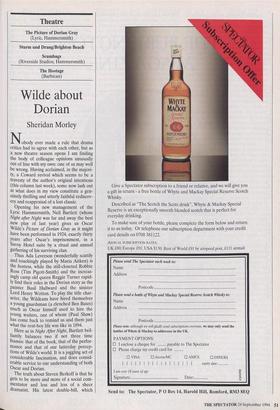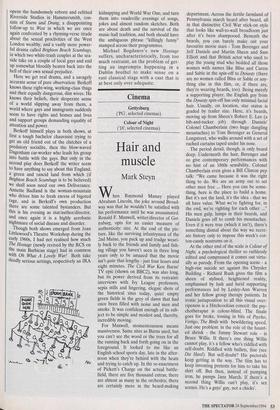Theatre
The Picture of Dorian Gray (Lyric, Hammersmith) Sturm and Drang/Brighton Beach Scumbags (Riverside Studios, Hammersmith) The Hostage (Barbican)
Wilde about Dorian
Sheridan Morley
Nobody ever made a rule that drama critics had to agree with each other, but as a new theatre season opens I am finding the body of colleague opinions unusually out of line with my own: one of us may well be wrong. Having acclaimed, in the majori- ty, a Coward revival which seems to be a travesty of the author's original intentions (this column last week), some now lash out at what does in my view constitute a gen- uinely thrilling and utterly faithful rediscov- ery and reappraisal of a lost classic.
Opening his new management of the Lyric Hammersmith, Neil Bartlett (whose Night after Night was far and away the best new play of last year) gives us Oscar Wilde's Picture of Dorian Gray as it might have been performed in 1924, exactly thirty years after Oscar's imprisonment, in a Savoy Hotel suite by a ritual and annual gathering of his surviving clan.
Thus Ada Leverson (wonderfully scattily and touchingly played by Maria Aitken) is the hostess, while the still-closeted Robbie Ross (Tim Pigott-Smith) and the increas- ingly camp old queen Reggie Turner rapid- ly find their roles in the Dorian story as the painter Basil Hallward and the sinister Lord Henry Wotton. To play the title char- acter, the Wildeans have hired themselves a young guardsman (a clenched Ben Bates) much as Oscar himself used to hire the Young waiters, one of whom (Paul Shaw) has come back to remind us and them just what the rent-boy life was like in 1894. Here as in Night After Night, Bartlett bril- liantly balances two if not three time frames: that of the book, that of the perfor- mance and that of our latterday percep- tions of Wilde's world. It is a juggling act of considerable fascination, and does consid- erable service to our understanding of both Oscar and Dorian.
The truth about Steven Berkoff is that he gets to be more and more of a social com- mentator and less and less of a sheer dramatist. His latest double-bill, which opens the handsomely reborn and refitted Riverside Studios in Hammersmith, con- sists of Sturm and Drang, a disappointing follow-up to West in which we are once again confronted by a rhyming-verse tirade about the sexual proclivities of the West London wealthy, and a vastly more power- ful drama called Brighton Beach Scumbags, in which two white-trash couples at the sea- side take on a couple of local gays and end up somewhat bloodily beaten back into the hell of their own sexual prejudice.
Here we get real drama, and a savagely accurate sense of pure observation: Berkoff knows these right-wing, working-class thugs and their equally dangerous, dim wives. He knows their beliefs, their desperate sense of a world slipping away from them, a world where gays and immigrants suddenly seem to have rights and homes and lives and support groups demanding equality of attention and power.
Berkoff himself plays in both shows, at first a tough bachelor chauvinist trying to get an old friend out of the clutches of a predatory socialite, then the blow-waved Dagenham car-worker who leads his group into battle with the gays. But only in the second play does Berkoff the writer seem to have anything to say about this England, a green and rancid land from which (if Brighton Beach Scumbags is to be believed) we shall soon need our own Deliverance. Annette Badland is the woman-mountain who drives him to fresh excess of bigoted rage, and in Berkoff's own production there are some talented bystanders. But this is his evening as star/author/director, and once again it is a highly acrobatic nightmare of social disease and disorder.
Though both shows emerged from Joan Littlewood's Theatre Workshop during the early 1960s, I had not realised how much The Hostage (newly revived by the RCS on the main Barbican stage) had in common with Oh What A Lovely War! Both take deadly serious settings, respectively an IRA kidnapping and World War One, and turn them into vaudeville evenings of songs, jokes and almost random sketches. Both are about death and the survival of the music-hall tradition, and both should have the ambiguous phrase "killingly funny" stamped across their programmes.
Michael Bogdanov's new Hostage suffers, uncharacteristically, from too much restraint, an the problem of get- ting an impromptu happening in a Dublin brothel to make sense on a vast classical stage with a cast that is at best only ever adequate.



































































 Previous page
Previous page